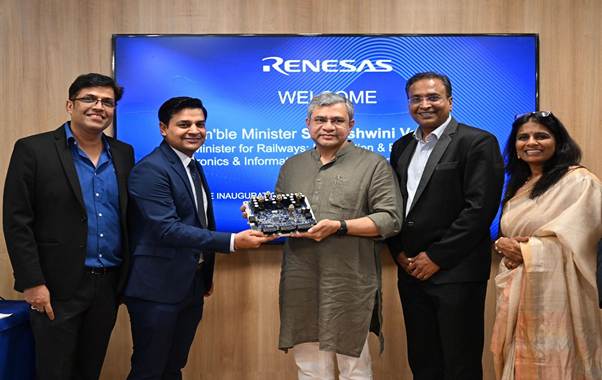India Unveils First 3nm Chip Design Centres in Noida and Bengaluru

Photo Credit: PIB
India has achieved a major breakthrough in the semiconductor industry with the launch of its first-ever 3nm chip design centres. Union Minister for Electronics & Information Technology, Railways, and Information & Broadcasting, Ashwini Vaishnaw, inaugurated two new state-of-the-art semiconductor design facilities by Renesas Electronics India in Noida and Bengaluru. These centres mark a significant advancement, as they are the first in India to focus on designing cutting-edge 3 nanometer chips, a key milestone in India’s growing role in global semiconductor innovation.
Minister Vaishnaw highlighted that India has previously worked on 7nm and 5nm chip technologies, but entering the 3nm space is a leap towards next-generation design capabilities. He emphasized that India is developing a strong, end-to-end semiconductor ecosystem which includes design, fabrication, assembly, testing, packaging, and a robust supply chain of equipment and materials.
The Minister also shared updates on the rising global confidence in India’s semiconductor capabilities, backed by participation in international forums like Davos and investment commitments from major companies such as Applied Materials and Lam Research.
To further accelerate talent development, a new semiconductor learning kit was announced. This will be distributed to over 270 academic institutions that have already received advanced Electronic Design Automation (EDA) tools under the India Semiconductor Mission. The initiative aims to produce industry-ready engineers by integrating software and hardware education.
Vaishnaw acknowledged the key role of CDAC and ISM in executing this vision and thanked Prime Minister Narendra Modi for prioritizing semiconductors as part of the Aatmanirbhar Bharat strategy. He stated that in just three years, India’s semiconductor journey has transformed from a nascent stage to an emerging global hub.
Hidetoshi Shibata, CEO & MD of Renesas Electronics, reaffirmed India’s importance in the company’s global operations, especially in embedded systems and innovation. He also praised India’s skilled talent pool and the supportive government policies such as the Chips to Startup and Design Linked Incentive schemes.
With this development, India takes a crucial step toward becoming a global semiconductor powerhouse.
Source: PIB




